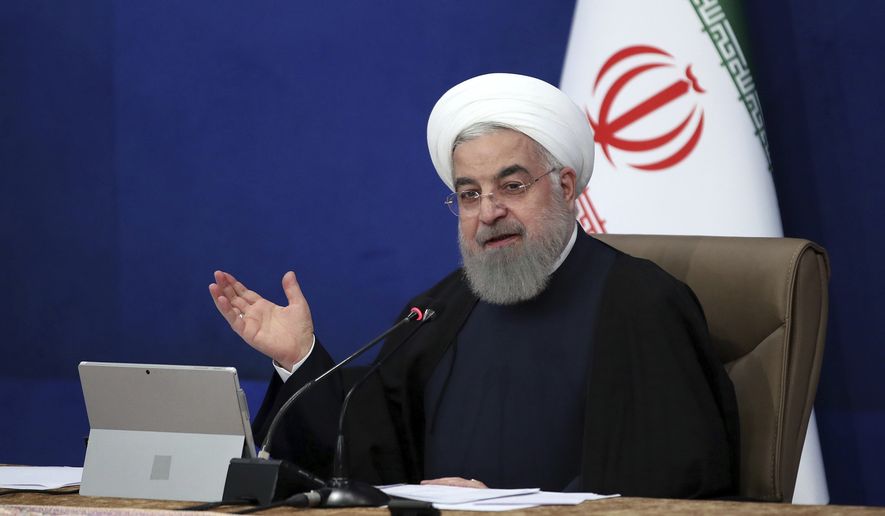The United States and Iran are at a diplomatic stalemate as both sides dig in and refuse to make the first move toward the resurrection of a landmark 2015 nuclear deal between Tehran and six world powers, including the U.S.
President Biden and Iranian Supreme Leader Ayatollah Khamenei said in no uncertain terms Sunday that their respective nation will not make the first formal overture, dashing hopes among Democratic lawmakers, pro-diplomacy advocates and some U.S. allies that the Biden administration would bring with it a rapid thawing of relations with Tehran and a permanent cooling of tensions that led the two countries to the brink of all-out war last year.
The future of the Obama-era Joint Comprehensive Plan of Action (JCPOA), which limited Iran’s nuclear program in exchange for relief from economic sanctions, hangs in the balance. Former President Donald Trump exited that deal in 2018, and Mr. Biden signaled during his campaign that he would seek to either re-enter that agreement or quickly craft another to take its place.
But Iran is demanding that the U.S. lift some economic sanctions as a first step. Biden administration officials, meanwhile, have said that Tehran must act first by bringing its uranium-enrichment levels back into compliance with the thresholds laid out in the JCPOA.
Mr. Biden left very little wiggle room when asked if the U.S. will lift sanctions first in order to get Iran back to the negotiating table.
“No,” the president said in an interview with CBS that aired Sunday.
SEE ALSO: Iran demands U.S. move first to salvage 2015 nuclear deal
Ayatollah Khamenei was equally forceful in his position.
“The side with the right to set conditions to #JCPOA is Iran since it abided by all its commitments, not US or 3 European countries who breached theirs,” he tweeted. “If they want Iran to return, US must lift all sanctions. We’ll verify & if it’s done properly, we’ll return to our commitments.”
Earlier Sunday, the supreme leader suggested that top Iranian officials had debated whether to act first and had decided against it.
“This is the definite policy of the Islamic Republic and it is also agreed upon by the officials of the country and we will not return from this policy,” Ayatollah Khamenei told Iranian military officials over the weekend, as quoted by Iranian media.
With both sides entrenched in their corners, it’s unclear how the Biden administration will find a path forward. The standoff with Iran poses a major geopolitical test for the new president and his diplomatic team.
The signing of the JCPOA marked a turning point in relations between Washington and Tehran. The historic agreement brought the U.S., Britain, France, Germany, Russia and China together in a united front that Iran must restrict its nuclear program in exchange for relief from sanctions.
But after Mr. Trump withdrew from the deal, his administration quickly implemented a “maximum-pressure campaign” to starve Iran’s economy.
Economic sanctions did indeed crush Iran financially, but they also contributed to a deterioration of relations between the two countries.
Mr. Trump’s time in office also saw Iran-linked attacks on U.S. troops in Iraq, an American airstrike that killed top Iranian Gen. Qassem Soleimani, and a host of other deadly incidents that have left the U.S.-Iran relationship in a far different place from where it was when the JCPOA was signed.
To move the ball forward, the administration wants Iran to take tangible steps to show it’s willing to abide by the terms of the JCPOA. During the final weeks of the Trump administration, Iranian officials announced that the country would once again enrich uranium up to 20% at its underground Fordo facility, putting the country’s nuclear program a few technical steps away from weapons-grade levels.
The Biden administration seems to be lowering expectations for a quick resolution to the enrichment at Fordo and other sticking points, saying that Iran cannot come back into full compliance with the agreement overnight.
“We are a long ways from that point. Iran is out of compliance on a number of fronts, and it will take some time, should it make a decision to do so, to come back into compliance, and time for us to assess whether it’s meeting its obligations,” Secretary of State Antony Blinken told reporters recently.
Mr. Blinken will play a central role in all diplomatic efforts with Iran, as will Robert Malley, recently tapped to be the State Department’s special envoy for Iran policy. Mr. Malley spent recent years heading the International Crisis Group think tank and is widely credited as one of the architects of the JCPOA.
Meanwhile, the Biden administration perhaps has offered some indirect help to Iran by halting its support of the Saudi Arabia-led war in Yemen.
The Yemeni government, backed by a Saudi-led coalition, has been battling Iran-backed Houthi rebels for the past six years. The Saudi war effort was greatly aided by U.S. weapons sales, which the administration has now halted.
The end of U.S. support could provide momentum toward ending the conflict, which has claimed at least 130,000 lives, according to some international estimates.
On Sunday, U.N. Special Envoy for Yemen Martin Griffiths was scheduled to meet with Iranian Foreign Minister Javad Zarif to continue negotiating a political solution to the war. Mr. Griffiths said his “immediate priority” is to establish a nationwide cease-fire.
⦁ David Sherfinski contributed to this report.
• Ben Wolfgang can be reached at bwolfgang@washingtontimes.com.




Please read our comment policy before commenting.